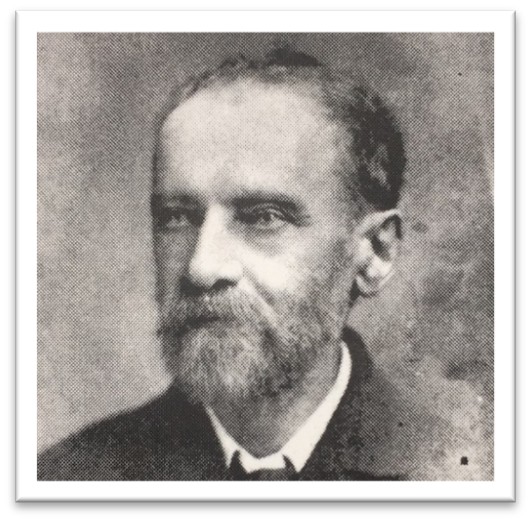
William Robert McDermott (1839-1918) became the most prominent of Poyntzpass’s medical practitioners. He was born in Dublin into a medical family,
His father was Dr Ralph Nash MacDermott, from Bunratty, who practised for many years at Athboy and Kells, Co Meath. His brother, Dr Ralph Jean MacDermott moved to England and practised in Petworth, Sussex.
William was privately educated, and entered Trinity College Dublin in 1859. After graduation he spent three years in the USA serving as a surgeon practitioner on the Confederate side during the American Civil War.
He was aged just 28 when he was appointed as Poyntzpass Dispensary District medical officer in 1867. He saw patients at the dispensary on Church Street every Monday and Friday from 9am to 11am.
MacDermott is such a well-known figure that he was the subject of one of the very first Poyntzpass local history articles published in ‘Before I Forget”. See “W R McDermott, Dispensary Doctor”, by Frank Watters, BIF Vol 1, 1987
Rabies
The Belfast News-Letter reported that on 28th August 1889 a young boy called Thomas Shevlin had been bitten by a rabid dog in the village. The dog was later cornered and shot by police. Dr MacDermott promptly arranged for Thomas to be sent to the Pasteur Institute in Paris (where Louis Pasteur had recently developed a rabies vaccine) via Greenore, accompanied by the Master of the Newry Workhouse. The boy’s fate is not recorded, but in July 1908, a Thomas Shevlin of Lisraw appeared at Poyntzpass Petty Sessions – so perhaps Pasteur’s vaccine worked. 🙂 Thomas Shevlin died in 1972.
First Aid
The good doctor’s name recurs in countless newspaper reports of violence or public disorder in or near Poyntzpass; for decades, MacDermott was a constant presence at the aftermath of such disturbances, patching up the injured.
Author
MacDermott also became an accomplished author. His novel “The Green Republic” was published in 1902 under the pen name A P A O’Gara; it argued the case for land ownership reform and a semi-industrial approach to agriculture, and is still in print. Its setting, the fictional town of Jigglestreet in Co. Tyrone, is a very lightly disguised version of Poyntzpass, and many of its characters are said to have been based on local people.
He also wrote “Foughilotra: A Forbye Story”, the story of a family of linen weavers, in Ulster-Scots dialect. The real townland of Foughill Otra is close to the S Armagh border, between Forkhill and Ravensdale.
He was a regular contributor to ‘The New Ireland Review’ on a host of topics, medical, sociological and more.
Public Health Campaigner
He was also a tenacious public health campaigner who repeatedly went head-to-head with the authorities, even including his own employers, over the decades spanning the end of the nineteenth century.
His biggest campaign was to get a proper system of sewers, and a treatment plant, installed in the village, and that campaign lasted from the late 1800s right up to his death. However, he repeatedly opposed the latest proposals by the Armagh and Down rural district councils, and especially those of the hapless Armagh County Surveyor Mr Dorman. Oddly, only MacDermott seemed to understand that no sewer system could possibly be effective until most houses had proper flushing toilets and a piped water supply to ‘power’ the sewers.
Death
W R McDermott died on 9th August 1918 aged almost 80. He had served as Poyntzpass (formerly Poyntzpass and Donaghmore) Dispensary District doctor, and on the Newry Union Board of Guardians, for nearly 50 years. He never married. His estate amounted to nearly £4,000, a substantial sum for the time.
His will expressed the wish that one beneficiary, Ralph Atkin of Co. Dublin, should change his surname to McDermott, but also emphasised that it was just a request, and not a condition of the bequest. He is buried in the graveyard of Acton Parish Church, in Poyntzpass. His gravestone states that it was erected by ‘Ralph McDermott’; Ralph was the son of his half-sister.
Legacy
A blue plaque now marks his former home and surgery in Church Street.